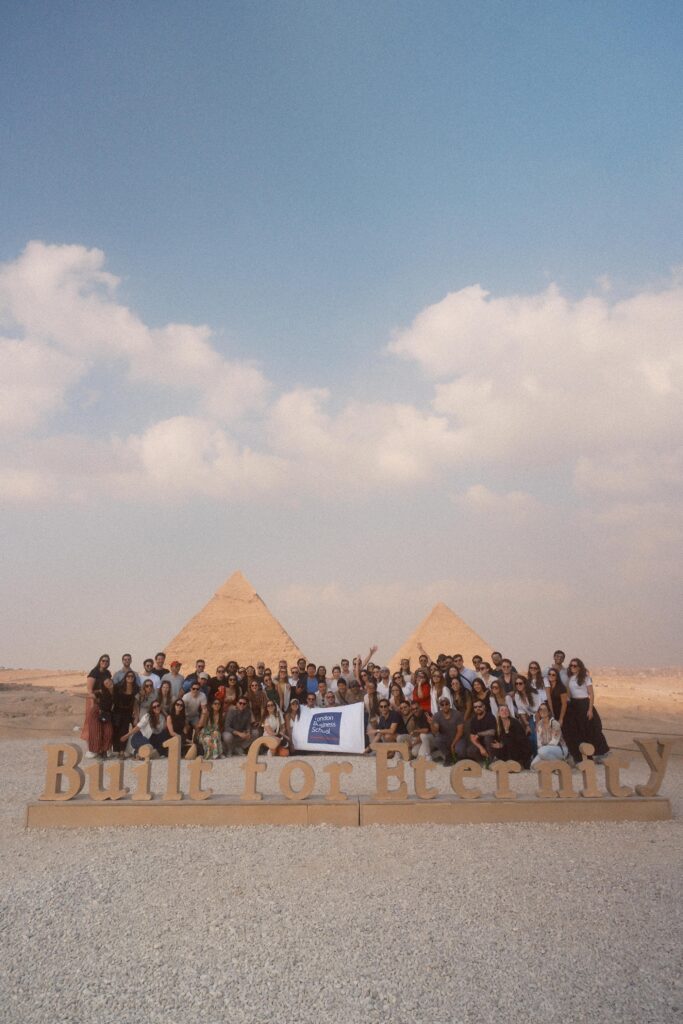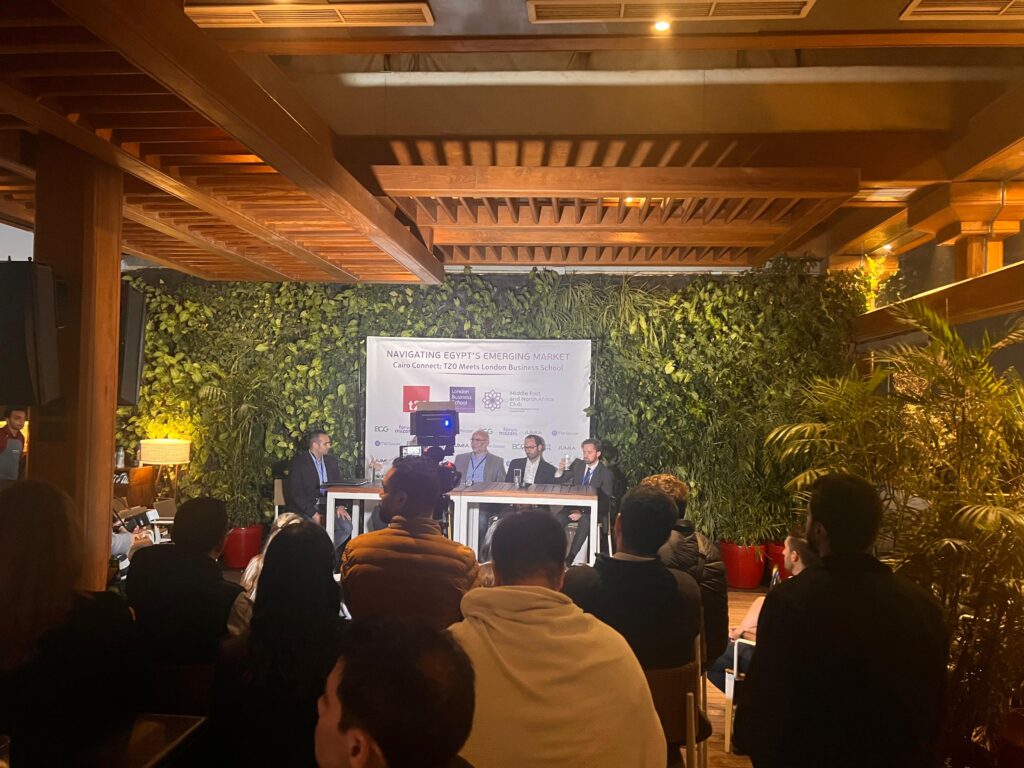
By Mark Toma, MBA2025
Egypt is often referred to as “Om El Donya”, a phrase that translates to “Mother of the World” or, more broadly, “Cradle of Civilization.” This sentiment encapsulates the country’s rich history, cultural depth, and enduring influence. Showcasing Egypt to 95 fellow classmates on the LBS Middle East and North Africa (MENA) Club Egypt Trek was nothing short of magical and an experience I take great pride in.
From standing before the Great Pyramids of Giza and visiting the Grand Egyptian Museum, to sailing the Nile and exploring The Valley of the Kings and Ramses’ Abu Simbel, every moment felt like stepping through time. My classmates also discovered the charm of El Gouna, a serene coastal town on the Red Sea. However, beyond the historical and cultural immersion, the trek provided profound insights into emerging market dynamics, including the complexities of wealth inequality, floating foreign exchange rates, and the critical infrastructure needed to support a population of 110 million people. Yet, these challenges also present significant opportunities for global investors looking to tap into high-growth markets.
A Historically Agrarian Economy
Ancient Egypt had a profound impact on writing, law, and architecture, shaping the development of Greek and Roman civilizations. At its core, Egypt’s economy was agriculture-based, heavily reliant on the Nile River for sustenance. The Egyptians pioneered irrigation techniques, large-scale grain production, and land management, eventually developing the 365-day calendar, which later influenced both the Julian and Gregorian calendars.
As Egypt entered the Greco-Roman era, Alexandria emerged as a global trading hub, linking Africa, Europe, and the Levant. However, Egypt’s long-standing dependence on agrarian wealth limited industrial development. Even under Ottoman rule, agriculture remained dominant, with the 19th-century cotton boom making cotton Egypt’s most valuable export. This deep-rooted reliance on agriculture continues to shape Egypt’s economy today.
Today, tourism remains a cornerstone of Egypt’s economy, contributing approximately 15% of employment and 14% of foreign inflows. Another critical economic asset is the Suez Canal, a key global trade route connecting Asia and Europe, significantly reducing travel time and costs by bypassing the Cape of Good Hope.
Lessons for Business School Students
Beyond the sightseeing, networking, and cultural immersion, trips like these provide valuable economic and business insights that are highly relevant to MBA students.
Egypt’s economy underscores the interdependence between geopolitical stability and economic resilience. The Russia-Ukraine war has disrupted wheat imports, driving up food prices and inflation, highlighting Egypt’s vulnerability to global market fluctuations. Additionally, Houthi attacks in Yemen have severely disrupted shipping activity through the Suez Canal, materially impacting revenues and posing further economic challenges. A diversified revenue base and avoiding over-reliance on concentrated income can help mitigate such risks in emerging markets.
We also saw first-hand the role of international financial institutions, such as the IMF, which provide loans, grants, and financial assistance to countries for development projects, poverty reduction, and economic stability. After Argentina, Egypt is currently the second-largest debtor to the IMF, with funding agreements that have required significant structural reforms, including:
- Floating the Egyptian pound (2016) – Led to a currency devaluation, affecting inflation and purchasing power.
- Subsidy cuts, particularly on fuel & electricity – Aimed at reducing the fiscal deficit but significantly increased the cost of living.
- Privatisation of state-owned enterprises (SOEs) – Intended to increase private sector participation in the economy.
These reforms can be compared and contrasted to other notable business school case studies, such as Mexico’s Tequila Crisis in the 1990s, Argentina’s sovereign default in 2001, and the Greek Eurozone meltdown in the 2010s.
Opportunities in Egypt’s Economy & Insights from T20 Egypt

In Cairo, we were fortunate to connect with T20 Egypt, a non-profit membership association comprising of Egyptian alumni from the world’s top 20 international business schools. T20 serves as a high-profile network of C-suite executives, business leaders, entrepreneurs, high-level government officials, and investors, and provided us with a valuable networking opportunity, including engagement with LBS alumni.
As part of this gathering, I had the privilege of hosting a panel discussion with leading executives to explore investment opportunities in the Egyptian market.
For any business looking to scale rapidly, Egypt is an ideal market due to:
- Low establishment costs
- A population of 110 million
- A labour force that can be upskilled quickly and affordably
This is particularly attractive for companies in manufacturing and FMCG, given cheap labour costs and geographical gateway, and also retail, given the high consumer population.
Additionally, there are a number of key sectors for investment:
- Fintech & Financial Inclusion – Egypt’s large unbanked population is driving demand for digital financial solutions, creating opportunities for fintech companies. A prime example is Fawry, Egypt’s first unicorn, which capitalised on this demographic by offering digital payments and financial services.
- Renewable Energy – Egypt’s geographical advantages and abundant sunlight have led to major renewable energy projects, such as the Benban Solar Park, one of the world’s largest solar installations. This aligns with global sustainability goals and is attracting international investment. Furthermore, hosting COP27 in Sharm El Sheikh is another example of Egypt’s commitment to sustainable development.
- Services & Offshoring – Egypt’s large, underemployed workforce and low labour costs make it a competitive hub for business process outsourcing (BPO) and IT services. While upskilling remains a challenge, this sector also presents an opportunity to leverage Egypt’s currency devaluation—businesses can hire talent in Egyptian pounds while earning in foreign currency, making operations highly cost-efficient.
Conclusion: Egypt is Open for Business
Our trek to Egypt was not just a cultural and historical experience—it was a deep dive into an emerging market brimming with opportunities. Egypt’s strategic location, young workforce, and economic reforms position it as a prime destination for global investors.
Yes, macroeconomic challenges exist, as they do in any developing economy. However, the business reforms, improving infrastructure, and sectoral growth in fintech, renewable energy, and offshoring present lucrative opportunities for those who understand the market dynamics.
For MBAs, policymakers, and investors, the key takeaway is clear: Egypt is open for business, and those who seize the opportunity early may reap the benefits of one of the region’s fastest-growing markets.
Special Thanks
On behalf of the LBS MBA, we extend our sincere gratitude to Hossam Targam and his team at Egypt Serai Travel for organising an unforgettable trek. We would also like to express our appreciation to T20 Chairman Abdellatif Olama (INSEAD ’04), T20 Treasurer Abbas Jammal (LBS ’12), Aly Wally (LBS ’10) and Victoria Golovanova for their invaluable support.
A special thank you to our esteemed T20 panel members—Alaa Hashim, Omar Shawki, Mohamed Okasha, and Francesco Bosi—for sharing their insights. Finally, we are grateful to our sponsors, Boston Consulting Group, Forviz Mazars, Jumia, and Mal Bazaar, for making this experience possible.
